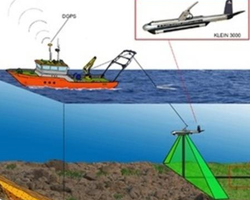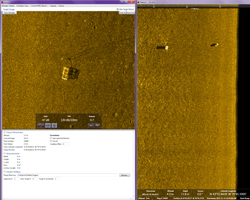Project
Let's clean our seabed of lost fishing gear
The challenge
For many species at risk, entanglements and collisions are among the main threats.
Large animals can become entangled in vertical ropes that remain suspended in the water column. More than 80% of North Atlantic right whales have become entangled in fishing gear at least once in their lifetime (Knowlton et al., 2012). Threats of entanglement have been clearly identified in recovery plans for some species at risk and/or assessments by the Committee on the Status of Endangered Wildlife in Canada (COSEWIC).


It is estimated that several tens of thousands of traps lie on the seabed.
Fishermen regularly lose traps every year. It is estimated that several tens of thousands of traps lie on the sea floor. These traps continue to catch the organisms they were designed to catch, generating ghost fishing. In addition, their line remains suspended in the water column for several years and poses a risk of entanglement for several large marine species, such as whales.
The solution
The objective of the "Action Pêche Fantôme" project is to reduce the threats of entanglement and bycatch on species at risk by conducting a campaign to recover lost snow crab traps in the Gulf of Saint Lawrence in the areas prioritized by the project team.
Equipping fishermen
Each year, the snow crab fishery generates a significant number of ghost traps due to factors beyond the control of the fishers, such as weather conditions and maritime traffic. It is therefore essential to equip fishers to be able to locate, retrieve and dispose of the fishing gear that lies on the seabed on a regular basis.
The partners wish to develop software technology to detect, identify and map lost gear in order to ensure its removal and recycling.
A unifying project
It is a federating project that joins together:
- Crab Fishermen's Associations in 3 regions of Québec Maritime
- Niche Marine Science and Technology Resources
Leverages the expertise of researchers from 2 centers and 1 research company:

The benefits
The "Ghost Fishing Action" project will remove a portion of ghost traps from the seabed in the Gulf of St. Lawrence, thus contributing to the Canadian effort to recover these traps throughout the Atlantic.
Several distinct components
To achieve this, the project team will work on several distinct components:
- Training for actors in the fishing industry and the valorization of residual materials;
- Demonstration activities on board fishing vessels;
- The implementation of a circular economy to recover fishing gear from the water and valorize it.
Promote sustainable fishing of the resource
The "Action Pêche Fantôme" project aims to enable crab fishers to integrate appropriate technologies into their fishing activities in order to promote sustainable fishing of the resource. It will enable fishermen's associations to acquire the required knowledge and master certain technologies for locating traps lost at sea, as well as the recovery tools so that they can be autonomous in the regulation of their fishing activities by 2023. The project will have a beneficial effect on the entire value chain from the capture of the resource to its processing and marketing.
- The project will allow for innovation by developing models of efficient recovery vehicles.
- These new machines will create jobs.
- The recovery of fishing traps will create jobs with companies responsible for recycling metal or plastic.
- This project will demonstrate to the Marine Stewardship Council (MSC) that the Quebec's crab fishing industry is taking the necessary steps to reduce its environmental impact.
...some commercial fishing products from Quebec could be banned in the United States.
Currently, global organizations such as the National Oceanic and Atmospheric Administration (NOOA) and marine mammal protection groups are closely monitoring the situation. If these organizations judge that Canada is not doing enough to reduce right whale mortality, the products of commercial fishing in Quebec could be banned in the United States. It should be noted that 78% of Quebec's commercial fishing products are exported to the United States.
Example of underwater data acquisition by sonar and data interpretation by the artificial intelligence (AI) algorithm developed by the CIDCO team:
Take part in the project: if you have possible positions of lost or abandoned ghost fishing gear, do not hesitate to contact us!

